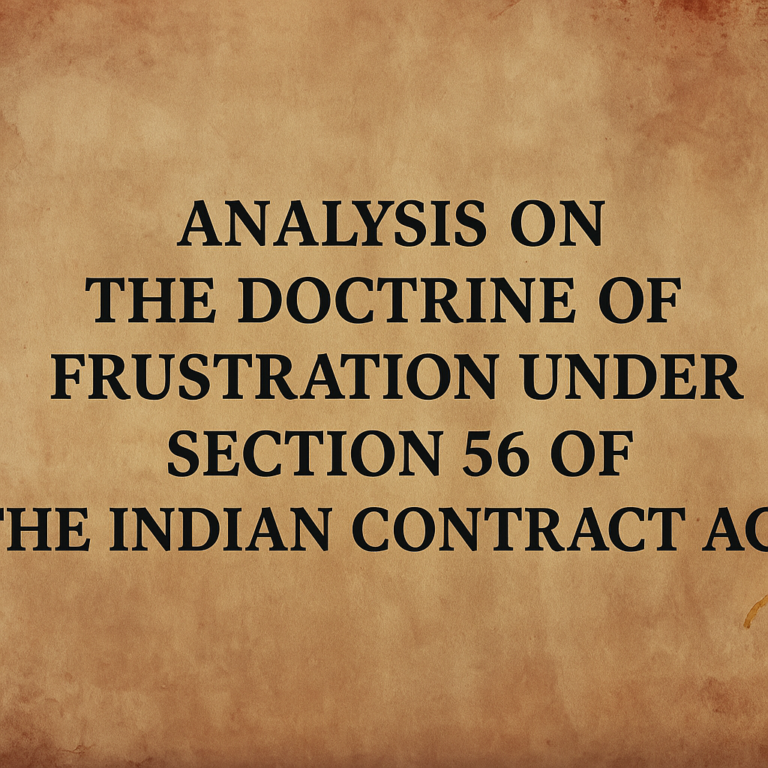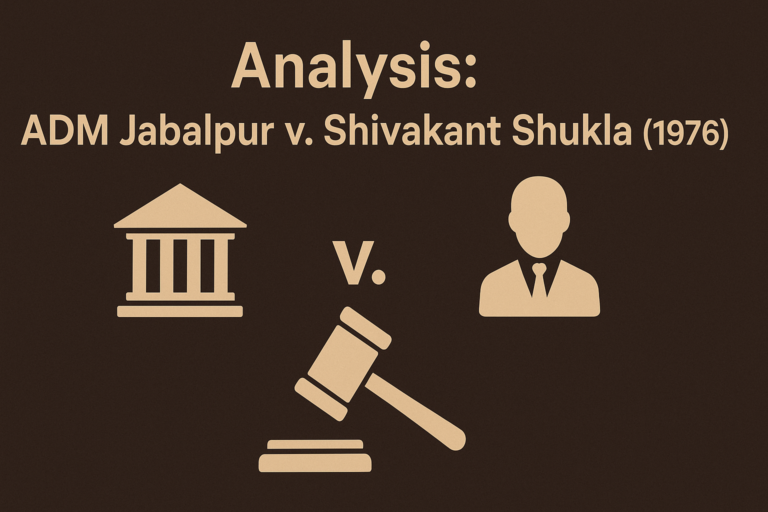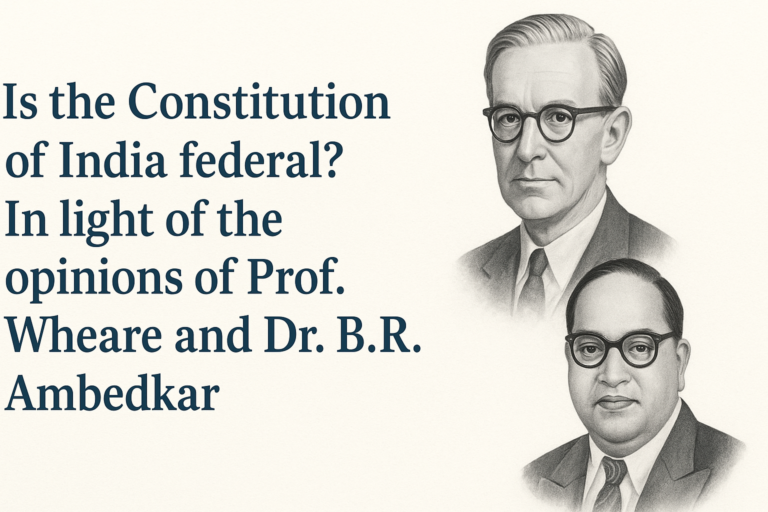This article has been written by Sumit Kumar, a 4th year student at Law college Dehradun, faculty of Uttaranchal university.
***This article has been published in LegalOnus Law Journal(LLJ)

Abstract
Discharge by performance is a fundamental principle in contract law, signifying the completion of contractual obligations. This paper explores two primary dimensions of discharge by performance: complete fulfilment and substantial performance. Complete fulfilment occurs when all terms of the contract are executed exactly as agreed, thereby fully satisfying the contractual duty. In contrast, substantial performance refers to a situation where a party has performed most of the contract terms, but there are minor deviations. This analysis delves into the legal nuances of both concepts, examining their implications for contract discharge, the criteria for substantial performance, and the legal remedies available for breaches. By examining case law and statutory provisions, the discussion aims to clarify the thresholds for complete and substantial performance, and their impact on the discharge of contractual obligations.
Introduction
In contract law, discharge by performance is a pivotal mechanism through which contractual obligations are fulfilled and concluded. Performance, as a means of discharging a contract, requires a party to execute the agreed terms to the satisfaction of the other party involved. This process can be categorized into two distinct forms: complete fulfilment and substantial performance.
Complete fulfilment denotes the scenario where a party has executed every term of the contract precisely as stipulated. This form of performance is straightforward, as it involves adherence to the exact terms, ensuring that the contract is entirely performed. It represents the ideal outcome where both parties have met their obligations in full, leading to the full discharge of the contract.
Conversely, substantial performance occurs when a party has executed the majority of the contractual terms, with only minor deviations from the agreed terms. While the performance is not flawless, it is sufficient to meet the essential purpose of the contract. The concept of substantial performance allows for a more pragmatic approach, acknowledging that minor non-compliance should not necessarily result in the total failure of the contract. Instead, it provides a basis for partial discharge and potential remedies for the aggrieved party.
Definition of Discharge by Performance
Discharge by performance means that the parties involved in a contract have fulfilled their respective obligations as outlined in the agreement. This mutual fulfilment of duties effectively ends the contractual relationship because the purpose of the contract has been achieved.
Complete Fulfilment of Contract
Complete fulfilment means that all terms and conditions of the contract are executed precisely as agreed upon. It includes delivering goods or services exactly as specified, meeting deadlines, and adhering to all contractual stipulations.
Criteria for Complete Fulfilment
To achieve complete fulfilment, the following criteria must be met:
Exact Performance: The performance must match the terms of the contract without deviation.[1]
Timeliness: The performance should occur within the agreed timeframe.
Quality: The goods or services must meet the quality standards outlined in the contract.[2]
Legal Implications of Complete Fulfilment
When a contract is fully performed, it is considered discharged. This means that neither party has any further obligations under the contract. Legal implications include:
Release from Liability: Parties are released from any further liability or claims related to the contract.
No Claim for Breach: Since the contract has been fully performed, the claims for breach of contract cannot be made.
Substantial Performance of Contract
Substantial performance occurs when a party fulfils most of their contractual obligations but may fall short in minor respects. This concept allows for some degree of deviation while still recognizing that the primary purpose of the contract has been achieved.
Criteria for Substantial Performance
To determine whether substantial performance has occurred, the following factors are considered:
Degree of Performance: The performance should meet the essential terms of the contract, though not necessarily in every detail.[3]
Impact of Deviations: The deviations should not undermine the contract’s primary purpose.
Intent: The performing party must demonstrate a good faith effort to fulfil the contract.[4]
Legal Implications of Substantial Performance
Substantial performance has distinct legal consequences:
Right to Payment: The party that has substantially performed is entitled to payment, albeit potentially reduced by the value of any defects or incomplete aspects.[5]
Partial Breach: The non-performing party may claim damages for any minor breaches, but cannot terminate the contract for substantial non-performance.[6]
Key Sections in the Indian Contract Act, 1872
Section 37: Obligation of parties to perform or offer to perform.
This section mandates that the parties to a contract must perform or offer to perform their respective promises unless such performance is excused or waived under the contract itself or any other applicable law.
Explanation:
Performance or Offer to Perform: This section mandates that both parties to a contract must fulfil their respective promises. If a party is required to do something under the contract, they must either perform that obligation or make a valid offer to perform it.
Excused Performance: If the performance is excused under any provisions of the Indian Contract Act or any other applicable law, the party is not required to perform. This includes scenarios such as impossibility of performance, waiver, or novation.
In the case of Lala Ram v. Ram Chandra[7] the Privy Council reinforced the obligation under Section 37 that parties must perform their contractual promises as agreed. It held that if a party fails to perform, they are liable to compensate the other party for any losses incurred due to the non-performance. The judgment stressed that exact performance of contractual obligations is mandatory, and deviations could lead to liability for damages.
In the case of K.K. Verma v. Union of India[8] the Supreme Court recognized that substantial performance is a valid form of performance under Section 37 if the primary obligations of the contract are met. It held that a party who has substantially performed is entitled to receive the agreed consideration, subject to adjustments for any minor defects or incomplete performance. The court emphasized that while complete performance is ideal, the essence of the contract must be fulfilled, and minor breaches should be addressed through deductions or damages rather than rejecting the performance entirely.
In the case of N. K. Jaiswal v. Union of India[9] the Supreme Court reaffirmed the principle under Section 37 that parties are bound to perform their promises as specified in the contract. It acknowledged that while exact performance is preferred, substantial performance may be sufficient if it fulfils the contract’s essential purpose. The court held that minor deviations or imperfections in performance do not necessarily invalidate the entire contract, and substantial performance allows for claims with adjustments for such minor issues.
Section 38: Effect of refusal to accept offer of performance.
When a party to a contract offers to perform its obligation and the other party refuses to accept it, the party making the offer is not liable for non-performance. This is considered an attempted performance or tender.
Explanation:
Offer of Performance: If the promisor makes a genuine offer to perform their part of the contract to the promisee, it should be in accordance with the terms of the contract.
Refusal by Promisee: If the promisee refuses to accept the offer of performance, the promisor is not held responsible for the non-performance of the contract.
Rights Preserved: The promisor does not lose any rights under the contract due to the promisee’s refusal. The promisor retains the rights to enforce the contract or seek damages.
In the case of S.K. Gupta v. Union of India[10] the court held that failure to perform contractual promises under Section 38 leads to liability for damages, emphasizing the necessity of fulfilling contractual obligations. It acknowledged that substantial performance might be recognized if it aligns with the contract’s main objectives, though minor deviations could lead to claims for compensation.
Section 40: Person by whom promise is to be performed.
This section states that if it appears from the nature of the case that it was the intention of the parties to the contract that any promise contained in it should be performed by the promisor himself, such promise must be performed by the promisor. In other cases, the promisor or his representatives may employ a competent person to perform it.
Explanation:
Intention for Personal Performance: If the contract explicitly or implicitly indicates that the promisor must personally perform the promise, the promisor is obligated to do so.
Third-Party Performance: In cases where the contract does not specify that the performance must be personal, the promisor or their representatives can delegate the performance to a competent third party.
Nature of Contract: The nature of the contract and the intention of the parties at the time of the agreement are crucial in determining whether personal performance is required.
Section 41: Effect of accepting performance from third person.
If the promisee accepts performance from a third person, the promisee cannot afterward enforce performance against the promisor.
Explanation:
Acceptance of Third-Party Performance: If the promisee accepts the performance of the contractual obligation from a third person, it releases the promisor from their obligation to perform.
Discharge of Promisor’s Obligation: By accepting the performance from a third party, the promisee acknowledges satisfaction of the contract, thus discharging the promisor from further liability or obligation under the contract.
Section 42: Devolution of joint liabilities.
When two or more persons have made a joint promise, the promisee may, in the absence of an express agreement to the contrary, compel any one or more of such joint promisors to perform the whole of the promise.
Explanation:
Joint Promise: When a promise is made by two or more persons together, they are collectively known as joint promisors.
Obligation during Joint Lives: All joint promisors are jointly responsible for fulfilling the promise while they are all alive.
Obligation after Death: If one of the joint promisors dies, their legal representatives, along with the surviving promisor(s), must fulfil the promise.
Obligation After All Promisors’ Deaths: If all joint promisors die, their legal representatives are collectively responsible for fulfilling the promise.
Section 43: Any one of joint promisors may be compelled to perform.
Each promisor may compel contribution, and the promisee can compel any one of the joint promisors to perform the contract.
Explanation:
Right of Promisee: The promisee can compel any one or more of the joint promisors to perform the entire obligation, regardless of internal agreements between the joint promisors.
Contribution among Promisors: After performing the promise, a promisor who has fulfilled the obligation can seek contribution from the other joint promisors. Each joint promisor is responsible for an equal share, unless the contract specifies otherwise.
Default in Contribution: If one of the joint promisors fails to contribute their share, the remaining promisors must share the loss equally.
Section 56: Agreement to do an Impossible Act:
A contract to do an act which, after the contract is made, becomes impossible, or by reason of some event which the promisor could not prevent, unlawful, becomes void when the act becomes impossible or unlawful.
Explanation:
Initial Impossibility: Any agreement to do something inherently impossible is void from the outset. If the act is impossible at the time of making the contract, the contract is void ab initio (from the beginning).
Subsequent Impossibility or Unlawfulness: If an act becomes impossible or unlawful after the formation of the contract due to unforeseen events beyond the control of the promisor, the contract becomes void. This is the principle of frustration, where the contract is discharged because the fundamental basis of the contract has changed, making performance impossible or illegal.
Knowledge of Impossibility: If the promisor knew or could have reasonably known that the act was impossible or unlawful at the time of making the promise, and the promisee was unaware, the promisor must compensate the promisee for any loss incurred due to non-performance.
Types of Performance
Actual Performance
Actual performance occurs when a party fulfils their contractual obligations exactly as specified in the contract. This type of performance meets all the terms of the agreement, including quantity, quality, time, and manner of performance. The party performing must do so in full accordance with the contract terms for it to be considered actual performance.
Example: A contracts to deliver 100 bags of rice to B by a specific date. A delivers all 100 bags on the agreed date, meeting all quality and quantity specifications. This is actual performance.
Legal Implication:
Actual performance typically discharges the promisor from their contractual obligations.
The promisee must accept the performance, unless there is a legitimate reason for rejection.
Attempted Performance (Tender of Performance)
Tender of performance refers to a party’s attempt to fulfil their contractual obligations, even if the other party does not accept the performance. The performance must be offered in a manner and at a time specified in the contract. Tender must be made in good faith, and it should be a genuine attempt to fulfil the contract.
Example: A offers to deliver the 100 bags of rice to B on the agreed date. B, however, refuses to accept the delivery. A’s action of offering to deliver constitutes a tender of performance.
Legal Implications:
Tender of performance, if valid, can discharge the promisor from liability for non-performance, provided the offer was made properly and the refusal was unjustified.
It can also be used to avoid liability for breach if the promisee’s refusal to accept the performance is not justified.
Conditions for Valid Performance
Exactness: The performance must conform exactly to what was stipulated in the contract. Any deviation could result in non-performance or partial performance.
Time: If the contract specifies a time for performance, it must be performed within that time unless time is not of the essence. If time is not stipulated, the performance should be within a reasonable period.
Manner: The performance must be in the manner specified in the contract. For example, if the contract specifies delivery at a particular location, the delivery must occur there.
Place: Performance must take place at the location specified in the contract, or if no location is specified, at the place where the contract was made or where it is reasonable to perform the contract.
Performance by Whom
Promisor or His Agent: The promisor himself or his authorized agent must perform the contract. The promisor can delegate performance unless the contract specifically requires personal performance due to the nature of the task.
Third Person: Performance by a third party is acceptable if the promisee accepts it. Once accepted, the promisee cannot later claim non-performance by the promisor.
Joint Promisors
Section 42: When a contract involves joint promisors, each promisor is jointly and severally liable for the performance of the entire contract. This means the promisee can enforce the contract against all joint promisors collectively or individually.
Section 43: The promisee can compel any one of the joint promisors to perform the whole promise. The performing promisor can then seek contribution from the other joint promisors.
Effects of Non-Performance
Breach of Contract: Non-performance of contractual obligations constitutes a breach of contract. The aggrieved party is entitled to legal remedies which may include damages, specific performance, or rescission of the contract.
Legal Recourse: The non-breaching party may pursue various legal actions depending on the nature and severity of the breach. These actions can include:
Damages: Payments made for the sake of compensating loss sustained from non-performance.
Specific Performance: An order from a court that makes one party performs its contract.
Rescission: A termination of the agreement that frees both parties of their commitments.
Relationship with Limitation Act
Time-Barred Claims
The Limitation Act, 1963, prescribes specific periods within which legal actions must be initiated. If a party fails to initiate a claim within the prescribed period, the claim becomes time-barred, meaning it can no longer be legally enforced.
Article 55 of the Limitation Act, 1963: This article states that for compensation for the breach of any contract, the limitation period is three years. The time begins to run from:
The date from when the contract is broken.
In case of successive breaches, the date from when the breach in respect of which the suit is instituted occurs.
In case of a continuing breach, from the date when the breach ceases.
Example: Suppose A and B enter into a contract on January 1, 2020, and A breaches the contract on January 1, 2021. Under Article 55, B has until January 1, 2024, to file a suit for compensation. If B fails to file within this period, the claim becomes time-barred.
Extension of Time
Section 22 of the Limitation Act, 1963: This section deals with continuing breaches and states that in the case of a continuing breach of contract or a continuing tort, a fresh period of limitation begins to run at every moment of the time during which the breach or the tort continues.
Implication: If a breach is discovered later, the limitation period starts from the date of discovery or the end of the continuing breach.
Example: If a breach of contract by A is discovered by B on January 1, 2022, and it is a continuing breach, B’s limitation period would start from the date of discovery or the date when the breach ceases. Therefore, B could have until January 1, 2025, to file the claim.
Acknowledgment of Debt or Liability
Section 18 of the Limitation Act, 1963: This section states that where, before the expiration of the prescribed period for a suit or application in respect of any property or right, an acknowledgment of liability in respect of such property or right has been made in writing and signed by the party against whom such property or right is claimed, a fresh period of limitation shall be computed from the time when the acknowledgment was so signed.
Implication: If there is an acknowledgment of debt or liability in writing before the original limitation period expires, a fresh limitation period begins from the date of acknowledgment.
Example: If A acknowledges in writing on January 1, 2023, that A owes B for a breach that occurred on January 1, 2021, a new three-year limitation period starts from January 1, 2023. Thus, B has until January 1, 2026, to file a claim.
Conclusion
Discharge by performance in contract law can be achieved through two primary approaches: complete performance and substantial performance. Complete performance occurs when all contract terms are fully met, discharging the contract entirely. Substantial performance, on the other hand, acknowledges that while not every detail may be perfectly executed, the essential terms are fulfilled. This doctrine allows the performing party to be compensated, though they may need to address any remaining deficiencies. Both methods ensure that contractual obligations are honoured and provide practical solutions for addressing incomplete performance, fostering fairness and equity in contractual relationships.
[1] K.K. Verma v. Union of India (AIR 1984 SC 1724)
[2] Indian Oil Corporation Ltd. v. Amritsar Gas Service (AIR 1991 SC 1044)
[3] T.B. and Sons Ltd. v. Union of India (AIR 1951 Cal 671)
[4] Lal Chand v. H.L. Gupta (AIR 1951 SC 544)
[5] Smt. K.K. Verma v. Union of India (AIR 1984 SC 1724)
[6] Union of India v. H.L. Ghodke (AIR 1951 SC 226)
[7] Lala Ram v. Ram Chandra AIR 1929 PC 87
[8] K.K. Verma v. Union of India AIR 1954 SC 275
[9] N. K. Jaiswal v. Union of India AIR 1964 SC 1304
[10] S.K. Gupta v. Union of India AIR 1954 SC 275








